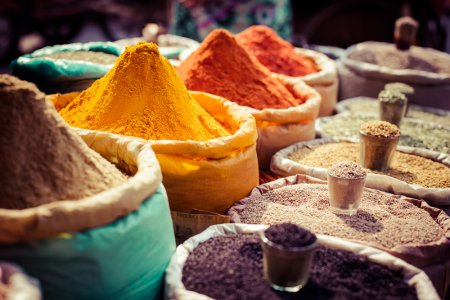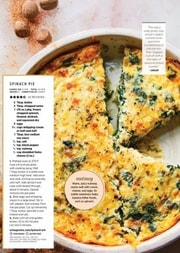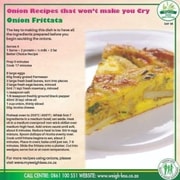Discover the shocking substances lurking in dried herbs and spices!
By
VanessaC
- Replies 0
When we reach for the dried herbs and spices in our pantry, we're looking to add a touch of flavour and zest to our meals.
These culinary staples are the essence of our home cooking, transforming the mundane into the magnificent with just a sprinkle or a dash.
However, recent investigations have revealed a less savoury side to these kitchen must-haves—enough to make any food lover's stomach turn.
According to a report by the Food Standards Agency in the UK (FSA), a variety of unappetising and potentially harmful substances have been found mixed in with some dried herbs and spices.
The FSA's Surveillance Sampling Project, which tested 1,215 food samples from supermarkets and smaller retailers across England, Wales, and Northern Ireland, has brought to light some disturbing findings.
Oregano, a herb beloved for its robust flavour, was identified as the most problematic, with 13 per cent of samples containing 'foreign green leaf'—often ground-up olive leaf, which mimics oregano's bitter taste but is not what consumers expect to find in their seasoning.
In total, a shocking 27 per cent of the dried oregano tested fell short of purity standards.
Some samples were found to contain insect fragments, synthetic fibres, and even an 'excessive' amount of lead—a toxic metal that poses significant health risks.
Ground nutmeg was also found to be inauthentic or contaminated in 21 per cent of samples, with some containing mycotoxins—dangerous mould-based toxins that can infect crops and enter our food supply.
Turmeric, another popular spice, was not immune either, with 3 per cent of samples concealing these same unwelcome toxins.
This isn't the first time the integrity of our herbs and spices has been called into question.
A major EU study in 2021, examining almost 1,900 samples from 23 countries, found that 17 per cent showed signs of adulteration.
Oregano once again topped the list, but pepper, cumin, turmeric, and saffron also had high instances of contamination.
The inedible additives ranged from chalk and dyes to coffee bean husks—substances used to bulk out jars of dried produce, deceiving consumers and potentially causing harm.
The £17 billion global herbs and spices industry is particularly susceptible to 'food fraud', a term used to describe the deliberate substitution, addition, tampering, or misrepresentation of food products.
This widespread issue is not limited to a handful of dishonest producers; it's a systemic problem that has attracted the attention of criminal enterprises.
For instance, one Europol investigation uncovered a gang in Spain producing counterfeit saffron, valued at £8.5 million, and exporting it globally.
Even more concerning, a recent study by BBC Four's The Food Programme found that 11 per cent of herbs and spices purchased from well-known retailers, including Sainsbury's, ASDA, and Amazon, contained ingredients not listed on the labels.
In response to these alarming discoveries, Professor Rick Mumford, Deputy Chief Scientific Advisor and Director of Science, Research, and Evidence at the FSA, has announced that funding is being allocated for local authorities to sample herbs and spice blends themselves in an endeavour to eradicate counterfeit goods from the marketplace.
'We will continue to carry out surveillance programmes to identify and find emerging risks within the UK food system to help ensure the safety of consumers,' he added.
 What are your thoughts on this issue, dear members? Let us know in the comments below!
What are your thoughts on this issue, dear members? Let us know in the comments below!
These culinary staples are the essence of our home cooking, transforming the mundane into the magnificent with just a sprinkle or a dash.
However, recent investigations have revealed a less savoury side to these kitchen must-haves—enough to make any food lover's stomach turn.
According to a report by the Food Standards Agency in the UK (FSA), a variety of unappetising and potentially harmful substances have been found mixed in with some dried herbs and spices.
The FSA's Surveillance Sampling Project, which tested 1,215 food samples from supermarkets and smaller retailers across England, Wales, and Northern Ireland, has brought to light some disturbing findings.
Oregano, a herb beloved for its robust flavour, was identified as the most problematic, with 13 per cent of samples containing 'foreign green leaf'—often ground-up olive leaf, which mimics oregano's bitter taste but is not what consumers expect to find in their seasoning.
In total, a shocking 27 per cent of the dried oregano tested fell short of purity standards.
Some samples were found to contain insect fragments, synthetic fibres, and even an 'excessive' amount of lead—a toxic metal that poses significant health risks.
Ground nutmeg was also found to be inauthentic or contaminated in 21 per cent of samples, with some containing mycotoxins—dangerous mould-based toxins that can infect crops and enter our food supply.
Turmeric, another popular spice, was not immune either, with 3 per cent of samples concealing these same unwelcome toxins.
This isn't the first time the integrity of our herbs and spices has been called into question.
A major EU study in 2021, examining almost 1,900 samples from 23 countries, found that 17 per cent showed signs of adulteration.
Oregano once again topped the list, but pepper, cumin, turmeric, and saffron also had high instances of contamination.
The inedible additives ranged from chalk and dyes to coffee bean husks—substances used to bulk out jars of dried produce, deceiving consumers and potentially causing harm.
The £17 billion global herbs and spices industry is particularly susceptible to 'food fraud', a term used to describe the deliberate substitution, addition, tampering, or misrepresentation of food products.
This widespread issue is not limited to a handful of dishonest producers; it's a systemic problem that has attracted the attention of criminal enterprises.
For instance, one Europol investigation uncovered a gang in Spain producing counterfeit saffron, valued at £8.5 million, and exporting it globally.
Even more concerning, a recent study by BBC Four's The Food Programme found that 11 per cent of herbs and spices purchased from well-known retailers, including Sainsbury's, ASDA, and Amazon, contained ingredients not listed on the labels.
In response to these alarming discoveries, Professor Rick Mumford, Deputy Chief Scientific Advisor and Director of Science, Research, and Evidence at the FSA, has announced that funding is being allocated for local authorities to sample herbs and spice blends themselves in an endeavour to eradicate counterfeit goods from the marketplace.
'We will continue to carry out surveillance programmes to identify and find emerging risks within the UK food system to help ensure the safety of consumers,' he added.
Key Takeaways
- The Food Standards Agency in the UK (FSA) has conducted an investigation and revealed that dried herbs and spices may contain contaminants such as insect fragments, synthetic fibres, and traces of mould.
- Oregano is the most commonly adulterated herb, with some samples containing a 'foreign green leaf' and contaminants like lead.
- The global herbs and spices industry is vulnerable to 'food fraud', with a significant number of samples testing positive for adulteration.
- Local authorities in the UK have received funding to test herb and spice blends in order to crack down on fake products and ensure consumer safety.









